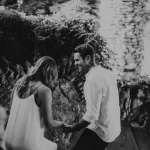Ending a relationship isn’t always dramatic. Sometimes it’s quiet, gradual, and deeply painful. Here’s what truly happens when you choose to walk away.
Take a deep breath with me.
This is one of those posts that’s been living in the notes app of my heart for months—rewritten, deleted, avoided. I didn’t know how to express it. I wasn’t sure if I should express it. And to be completely honest, I felt embarrassed.
But today, I’m ready. So here it is:
After more than a decade together, I made the decision to end my relationship.
Not because of a dramatic betrayal. Not because of a heated argument or sudden rupture. But because of something quieter. Something harder to articulate. A gradual unraveling—a kind of emotional erosion that gradually wore away my joy, my energy, and ultimately, my sense of self.
Ending a relationship—especially one that’s lasted years—isn’t always a loud, obvious decision. Sometimes, it’s the culmination of years of trying, hoping, compromising, and diminishing yourself.

The Invisible Breakdown: Death by a Thousand Cuts
When something isn’t working, we don’t always recognize it immediately. This is especially true if you’re someone like me—someone who understands relationships, who’s helped others create lasting love, who believes in doing the work.
You start making accommodations. You compromise your needs. You adjust your standards just a little more. You use every tool available to try to improve the situation.
And in the process, often without realizing it, you begin abandoning yourself.
That’s what happened to me.
What began as a healthy connection slowly transformed into something that no longer felt nourishing. And yet, I stayed. Because the love was still present. Because I had made a commitment. Because I believed I should be able to fix it.
But here’s the truth: love alone isn’t always enough to sustain a relationship. Especially when the person you’re becoming within that love is slowly fading away.
When You’re the One Who Walks Away
You want to know something remarkable?
The moment I finally said, “I can’t do this anymore,” was the moment everything began changing—for him.
He started healing. He became more open. More self-aware. He began showing up in the ways I had yearned for over the years.
And as much as I wanted to feel happy about those changes… I was exhausted.
The damage had already been done. I had spent so long waiting for that version of him to appear, holding onto hope, thinking this next conversation will be the breakthrough.
By the time it actually happened, my heart couldn’t hold on any longer.
That’s one of the most painful realities about ending a relationship. You can love someone deeply, and still know it’s time to let go.
Why Leaving Is So Difficult
Even when you logically know it’s not working, walking away from a long-term relationship can feel impossible.
You second-guess yourself. You cling to the potential. You remember the good times. You tell yourself it’s just a rough patch—or worse, you convince yourself that maybe this is simply what love looks like after ten years.
But your body knows.
Mine did too. For months, I felt the anxiety. The tension. The grief that came not from a breakup—but from the slow death of a connection where I no longer felt safe.
I knew what I needed to do. I had the language. I had the coaching skills. I could list all the reasons why it was no longer working.
And still—I remained stuck.
Because here’s what no one tells you: our unconscious minds cling to the familiar. Even when the familiar is painful. Even when it no longer serves you.
Breaking Up as a Breakthrough
The moment I let go, everything transformed—not just in the relationship, but within me.
For the first time in years, I felt like I could breathe deeply. My nervous system relaxed. My creativity returned. My inner voice—once so quiet beneath the noise—came back to life.
And his breakthrough? It happened too. Ending the relationship forced both of us to grow in ways we hadn’t while remaining in it.
Sometimes, leaving isn’t just about ending something broken—it’s about initiating your own expansion.
Stepping Into a New Season
Now, for the first time in over a decade, I’m navigating love, dating, and daily life as a single woman.
Let me just say: it’s been quite a journey.
There have been moments of deep loneliness… and moments of incredible freedom. Days when I feel strong and empowered… and nights when I still grieve what might have been.
But this season? It’s also rich with learning. I’m rediscovering who I am outside of a long-term partnership. I’m healing. I’m reconnecting with the parts of myself that got lost in the relationship.
And I want to bring you along for this journey.
Not just the polished “I made it to the other side” version. But the real-time, messy, beautiful process of what it actually looks like to end a relationship—and come home to yourself in the process.
If You’re Standing at the Crossroads
Maybe you’re there right now.
You’ve been questioning whether to stay or go. You’re exhausted. You’re scared. You’ve tried all the “right” things. You want to believe in the potential… but you can’t ignore the quiet knowing inside you anymore.
If that’s you, please hear this:
- You are not broken.
- You are not a failure.
- You are allowed to want more.
- You are allowed to leave—even if nothing “catastrophic” happened.
- You are allowed to choose yourself.
Ending a relationship—especially one that looks good from the outside—requires courage. But staying in something that gradually erodes your spirit? That’s the real heartbreak.
Final Thoughts: Choosing Yourself Isn’t Selfish—It’s Sacred
Relationships are our greatest mirrors. They can stretch us, heal us, and sometimes—when the timing is no longer aligned—they invite us to let go.
Ending a relationship doesn’t mean it was all for nothing. It doesn’t mean you failed. It means you’re honoring your truth.
You deserve love that expands you. That nourishes your soul. That doesn’t require you to shrink, dim your light, or wait for someone else to finally catch up.
So if you’re in that in-between space right now—hurting, hoping, healing—just know: you’re not alone.
And I’m right here, walking this path with you.



 By
By